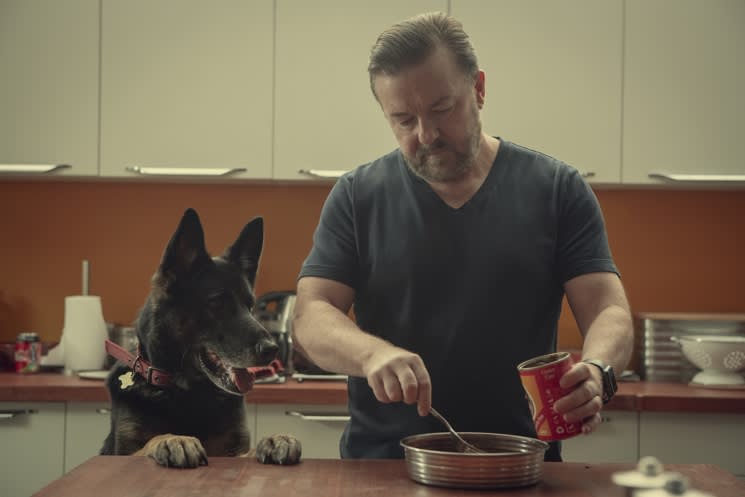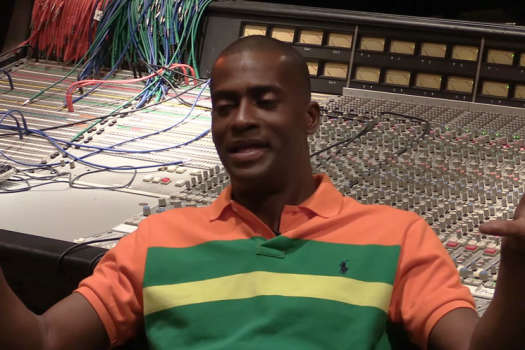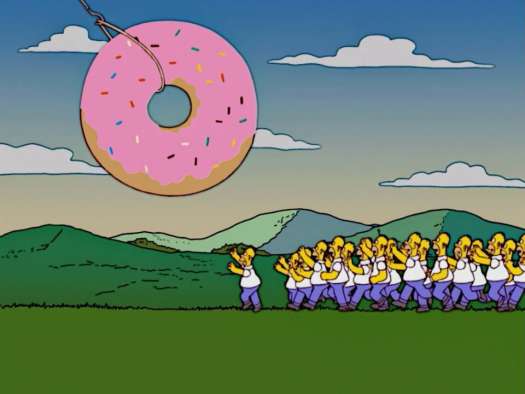Ricky Gervais returns to Netflix this month with his life-affirming and fitfully amusing second season of After Life. As with the first, there are moments of poignancy and insight scattered throughout (and even some laughs), but they come against an often oppressive backdrop of weepy sentimentality and folksy pablum that will be a real test for anyone hoping for a tour de force of Gervais's onetime caustic wit. Those looking for comfort food could do worse, but this is cloying stuff.
We are once again in the idyllic English town of Tambury, a cosmic nexus of the quirky and well-meaning, where everyone is struggling nobly against their personal everyday problems in their own quirky way. Its charms are lost on the recently widowed Tony (Gervais) however, as he continues to navigate the difficulties and relationships of life after losing his wife to cancer. Still working at the tiny local paper, sparring with his colleagues over the usual Gervais topical punching bags, and watching his seemingly endless supply of home movies of his wife, Tony has yet to find meaning to his life, but is at least making a point to be nice to those that are nice to him. It sets us up for various tender moments as he uses memories of his wife to give insight or strength to familiar faces in their times of need. It can be mawkish at times, with everyone seemingly on the brink of tears at any given moment, and if you took a drink every time "mournful piano" or "sentimental instrumentation" popped up on the closed captioning, you'd probably black out. The overall lesson seems to be that relationships and being in love are what make life worth living, which is fair enough, but unpacking these somewhat trite observations over six episodes requires a sharpness of wit, or at the very least a new angle, that the writing here doesn't always possess.
It isn't all bad, and the cast are certainly reliable, with wacky postman Pat (Joe Wilkinson) returning for more amusing intrusiveness. His budding relationship with sex worker Roxy (Roisin Conaty) is a sweet side arc, their dialogue coming across as some of the most real in the show. Gervais, sporting a scruffy grief beard throughout, remains compelling also, and the quiet moments he spends with his ailing dad are genuinely touching, as are his tentative steps towards romance with Ashley Jensen's careworker Emma. Far less amusing is Paul Kaye's apathetic psychiatrist character, who is back with even more outrageously sexualised, chauvinistic monologues. Kaye attacks the character with vigour, but beyond shock value it's fairly one-dimensional stuff (although there is an amusing shot of Tony's soft-spoken boss Matt nervously eying his foregrounded fingers after being told where they were the previous night). Expression-focused cutaways like these are overused in comedy these days, but given that Gervais basically invented the trend with The Office, you have to give him a pass.
Will After Life have the same impact in the years to come? It seems unlikely. The Office's smaller scale and scope lent it a focused and cohesive tone that is frankly lacking here. Instead we get bizarre, obscenity-laced rants sitting uneasily next to maudlin observations about love, death, and relationships. James (Ethan Lawrence), the son of one of Tony's colleagues, is made the butt of numerous jokes over his weight and eccentricities for instance, but is then lurchingly portrayed as worthy of our concern and sympathy with scant transition, and a joke about a past suicide attempt is left to dangle in a clumsy no man's land between humour and pathos, achieving neither. What are we supposed to feel here? It is inept.
It must be said the show looks great, with Tambury (an amalgamation of four shooting locations in Britain) standing out once again as a charming perfection of small-town British life, the heaven Tony can't see he's already in. That said, its glossy production values, once again accompanied by a raft of licensed music, are at odds with its hokey, small town feel — another mish-mash.
If you're in need of something that will go down easy and sweet, and don't mind laughing for the wrong reasons (like when the owner of the paper is convinced to brush aside the half million he'd make for selling after a few minutes of hearing Tony talk tenderly about his wife), After Life may be the answer — but if you've just finished something like Fleabag and are hungry for more of the same, steer clear.
(Netflix)We are once again in the idyllic English town of Tambury, a cosmic nexus of the quirky and well-meaning, where everyone is struggling nobly against their personal everyday problems in their own quirky way. Its charms are lost on the recently widowed Tony (Gervais) however, as he continues to navigate the difficulties and relationships of life after losing his wife to cancer. Still working at the tiny local paper, sparring with his colleagues over the usual Gervais topical punching bags, and watching his seemingly endless supply of home movies of his wife, Tony has yet to find meaning to his life, but is at least making a point to be nice to those that are nice to him. It sets us up for various tender moments as he uses memories of his wife to give insight or strength to familiar faces in their times of need. It can be mawkish at times, with everyone seemingly on the brink of tears at any given moment, and if you took a drink every time "mournful piano" or "sentimental instrumentation" popped up on the closed captioning, you'd probably black out. The overall lesson seems to be that relationships and being in love are what make life worth living, which is fair enough, but unpacking these somewhat trite observations over six episodes requires a sharpness of wit, or at the very least a new angle, that the writing here doesn't always possess.
It isn't all bad, and the cast are certainly reliable, with wacky postman Pat (Joe Wilkinson) returning for more amusing intrusiveness. His budding relationship with sex worker Roxy (Roisin Conaty) is a sweet side arc, their dialogue coming across as some of the most real in the show. Gervais, sporting a scruffy grief beard throughout, remains compelling also, and the quiet moments he spends with his ailing dad are genuinely touching, as are his tentative steps towards romance with Ashley Jensen's careworker Emma. Far less amusing is Paul Kaye's apathetic psychiatrist character, who is back with even more outrageously sexualised, chauvinistic monologues. Kaye attacks the character with vigour, but beyond shock value it's fairly one-dimensional stuff (although there is an amusing shot of Tony's soft-spoken boss Matt nervously eying his foregrounded fingers after being told where they were the previous night). Expression-focused cutaways like these are overused in comedy these days, but given that Gervais basically invented the trend with The Office, you have to give him a pass.
Will After Life have the same impact in the years to come? It seems unlikely. The Office's smaller scale and scope lent it a focused and cohesive tone that is frankly lacking here. Instead we get bizarre, obscenity-laced rants sitting uneasily next to maudlin observations about love, death, and relationships. James (Ethan Lawrence), the son of one of Tony's colleagues, is made the butt of numerous jokes over his weight and eccentricities for instance, but is then lurchingly portrayed as worthy of our concern and sympathy with scant transition, and a joke about a past suicide attempt is left to dangle in a clumsy no man's land between humour and pathos, achieving neither. What are we supposed to feel here? It is inept.
It must be said the show looks great, with Tambury (an amalgamation of four shooting locations in Britain) standing out once again as a charming perfection of small-town British life, the heaven Tony can't see he's already in. That said, its glossy production values, once again accompanied by a raft of licensed music, are at odds with its hokey, small town feel — another mish-mash.
If you're in need of something that will go down easy and sweet, and don't mind laughing for the wrong reasons (like when the owner of the paper is convinced to brush aside the half million he'd make for selling after a few minutes of hearing Tony talk tenderly about his wife), After Life may be the answer — but if you've just finished something like Fleabag and are hungry for more of the same, steer clear.




